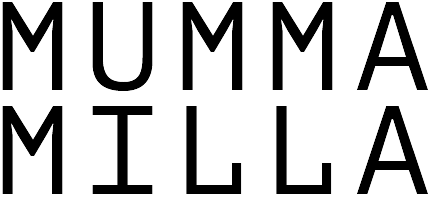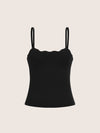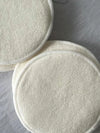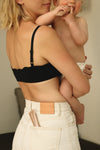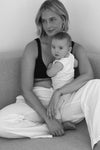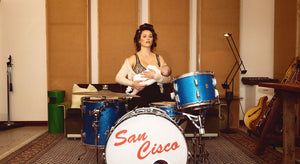Alice, a postpartum doula, who runs Village For me, brings a wealth of knowledge and lived experience to her support of new parents — having come to the world of postpartum from a career in family law, and experiencing her sense of purpose utterly transformed by motherhood.
She chats to us at M. Magazine about welcoming a second child into the world, tips to prevent postpartum depletion, the importance of eating well after giving birth, her 5-5-5 rule, and some sound advice about what to expect from a newborn.

What is a postpartum doula
A postpartum doula is someone who provides unconditional physical, emotional and informational support to new families following the birth of a new baby. As a postpartum doula, my focus is on the mother or new parents — because just as much as a baby needs unconditional love and support, so too do new parents. You are going to be the best parent for your baby if your needs are being met, and too often they fall by the wayside in the haze of constant feeding, sleep deprivation, and physical recovery. I am there to provide a non-judgmental ear, to help you navigate the often inconsistent advice and judgements thrown at new parents, to workshop the challenges you face day-to-day, to empower you to trust your gut, to nourish you with foods that promote your healing, to give you time to rest, and to guide you to evidence-based resources.
What do you offer as a postpartum doula to mothers and babies.
While every visit is different depending on how the family is feeling on that day, each visit we will make time to sit down and talk through the current challenges you are facing — either to workshop strategies to help you through them, or just to have an empathetic and impartial ‘ear’. This will generally be followed by a period of rest or rejuvenation for you — whether that is a nap in a bed with clean sheets, a long bath, a baby-free coffee down the street, or some solo time with your other children. During that time I will cook some nourishing food and help with things around the house (often with baby nestled in with me in the carrier — carriers + the doula sway tend to facilitate a very long nap for mum and baby!) Between visits, I am there to answer questions you may have about normal newborn behaviour, breastfeeding, the emotions that come up in the postpartum hormonal fog, among other things.

As a mum of two, what did you do differently the second time around.
Birth — in the period since having our first son I have learnt an immense amount about birth, initially through my own learning and more recently through my studies of midwifery, this led us to make the move from having having private obstetric care first time around, to having a home birth through our local hospital’s program. While I am in many ways grateful for my first birth experience, as without it I wouldn’t be where I am today, I am passionate about women and families becoming more informed about their birthing options (which shouldn’t just be dictated by whether or not they have private health cover), and the evidence behind different care options for both low and higher risk pregnancies.
Visitors and horizontal rest — we had our first son just as COVID was emerging overseas, which meant we had visitors (and waaaay too many of them) both every day in hospital, and in the weeks that followed. Not only was it exhausting emotionally and physically, but you just don’t get that precious newborn bubble time back. This time we instituted very clear boundaries, had no visitors for the first 7 days except our midwives, and took a very slow and staggered approach in the period that followed. I loosely followed the ‘5-5-5 rule’ of 5 days in bed, 5 days on the bed, and 5 days around the bed. For us, this looked like staying inside the house and largely horizontal (bed and then mainly couch-bound) for the first two weeks, honouring the fact that even though I felt physically great this time, there was so much recovery taking place inside my body from the pressures of pregnancy and birth, and emerging very slowly after that. My husband was an amazing feeder, house manager and toddler wrangler during this time, allowing me to really focus on recovery and our new baby. The combination of the wonderful birth experience and priorities of rest have made the world of difference in how I feel this time around.
The most pivotal/ profound thing you learnt becoming a mother for the first time
How much motherhood can take you by surprise.
Your favourite postpartum product you cannot live without.
A baby carrier — I prefer wrap carriers for my little doula babies and now for Billy. The carrier has been invaluable in allowing me to participate in the toddler bedtime routine and keep life as normal as possible for our 3 year old — and I find babies nap for so much longer when in the carrier environment that clearly takes them back to their snuggly time in the womb.
After a woman gives birth, what are the best things we can include in our diet.
Warm, easily digestible, protein and fibre-rich, foods. Think slow-cooked meat stews, soups, and spiced stewed fruits for digestion. Your nutrient needs in the early postpartum period are even greater than in pregnancy — not only are you feeding yourself and your baby, but you are also supporting your own physical recovery.

What does your day on a plate look like.
While I usually would shy away from a question like this, because I struggle at the best of times to feed myself particularly when working or studying from home (I am regularly that person who gets to 3pm having only had breakfast, only to have something totally inadequate to last me until dinner), we did put a lot of time into preparing food for the postpartum period to ensure that I would be well-nourished (and practice what I preach) and we (or my husband) could spend as little time in the kitchen as possible.
A typical early postpartum day on a plate for me looked like:
- Breakfast - Nepalese rice pudding with the digestive fruit compote from ‘Life Beyond Birth’ — I absolutely lived for this each morning for the first few weeks. It is warm, sweet and everything you need after a rough night of relentless feeding. The fruit compote (laden with pears, prunes, red dates) staved off postpartum constipation — something that I struggled with big time first time around. And a coffee.
- Snacks - slice of roast veggie frittata or one (or three) of my lactation cookies (filled with oats, flaxseed, peanut butter + choc chips)
- Lunch and dinner - one of the many meals we filled the freezer with - chicken congee with a soft boiled egg, persian chicken + fennel stew, chicken enchilada soup delivered by my friend and student midwife, beef + barley soup, among others.
- Drinks - water water water, pear juice (also excellent for avoiding constipation), some of the ’No bleed tea’ or breastfeeding tea from Blissful Herbs.
If you had to cook a 5 minute meal, what would it be
Chicken and corn egg drop soup - this involves heating up chicken bone broth with turmeric, salt and pepper, and sesame oil, adding corn kernels, bring a simmer and swirl the broth around, slowly pouring in beaten eggs and then cooked noodles. Finish with friend shallots, sesame seeds, and a splash of soy sauce.
Top tips for preventing postpartum depletion
- Prepare for your birth — birth experiences can play a pivotal role in how you enter your postpartum and early parenting experience.
- Prepare for your postpartum — how will you ensure you are fed, how will you carve out periods of rest, who will you turn to for support, what are your boundaries regarding visitors?
- Educate yourself on breastfeeding (if that is your chosen feeding method) and normal newborn behaviour before you have your baby
- Prepare nourishing foods or make a plan for how you will obtain them — there is so much to do before even considering stepping into the kitchen in the haze of newborn life.
- If you can afford to do so, outsource support — this may be a postpartum doula, cleaner, psychologist, extra daycare days for older children, among other options.
- Continue taking a good quality prenatal supplement (or breastfeeding equivalent)
- See a holistic healthcare professional for comprehensive blood tests to look for iron levels, thyroid function, and key deficiencies that arise in the postnatal period and impact on physical and mental health
Your advice to other mums, and dads, out there who are expecting a second child
Prioritise building a network of support. While I wish ’the village’ came to you automatically in postpartum, we have a long way to go before that is the case, and this can be even more so when you are onto subsequent children and the world thinks you have it all sorted. Sit down and plan who you will ask for help, communicate your boundaries, and your needs. And update them when they change. Four weeks in, we still have a full freezer thanks to the preparation we did, and the ongoing top ups from generous friends and family who have clearly heeded the message from my ongoing sharing of information about how to best support new parents. Accept help when it is offered, as uncomfortable as we may feel doing so!

Can you share a little about what a mother should expect when breastfeeding, especially for the first time
Babies do not run to a schedule, and are adjusting to life on the outside after having spent 9 months with food ‘on tap'. As much as you can, ignore the clock, both in terms of frequency of feeding and length of feeds. Babies feed for hunger, hydration, comfort, and to regulate their nervous system. Not every feed will be the same. Just as we have big meals, big drinks, and sips of water, babies also feed in different patterns. While it is relentless, surrendering to the intensity of feeding in the newborn days will set you up for success. If something doesn't feel right, seek professional support (and early). Just like with birth, focus on the positive stories around you and seek advice from trusted advisors.
We designed our product to help make post birth and breastfeeding a little bit easier, and more comfortable. We'd love to hear what you think about the MUMMA MILLA leakproof nursing bralettes.
As a very leaky breastfeeder, I have been loving the Mumma Milla bralette as it helps me to avoid sopping wet tops and endless washing, as well as wasteful disposable breast pads. It has a great shape that felt supportive in late pregnancy and the early days of breastfeeding as my breasts fluctuated with engorgement and then stabilised in the weeks that followed.
Alice wears the leakproof night bralette in black.
Photography by Cara Mand.


